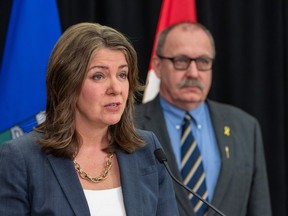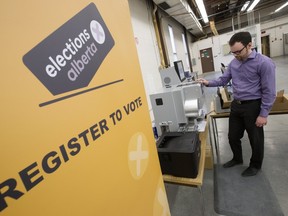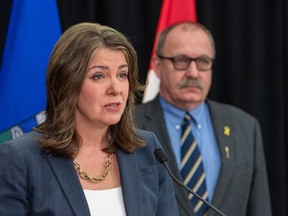Breadcrumb Links
columnist
Published on May 27, 2024 • Last updated 4 hours ago • 4 minute read
To save this article, register for free here, or sign in if you have an account.
 Premier Daniel Smith and Minister of Municipal Affairs Rick McIver discuss a bill addressing the agreement between the federal and provincial governments in Edmonton on April 10, 2024. Photo by Greg Southam/Postmedia
Premier Daniel Smith and Minister of Municipal Affairs Rick McIver discuss a bill addressing the agreement between the federal and provincial governments in Edmonton on April 10, 2024. Photo by Greg Southam/Postmedia
Article Contents
This spring, I taught a course on Canadian democracy, with the goal of looking at Canada through a democratic lens in a global context where every indicator and study shows that the number of democracies is declining and even established ones are in danger.
These trends have led political scientists and historians to spend the last decade studying how and why democracies decline. They call the phenomenon “democratic retreat,” and their studies have titles like “How Democracies Disappear” and “Democracy Eroded from Above.”
Ad 2
This advertisement has not loaded yet, but article continues below.
This content is available to subscribers only
Subscribe now to read the latest news from your city and across Canada.
Exclusive articles from David Staples, Keith Gerein and more, Oilers news from Cult of Hockey, Ask EJ Anything features, Noon News Roundup and Under the Dome newsletter. Get unlimited online access to the Edmonton Journal and 15 news sites with one account. The Edmonton Journal ePaper is a digital version of the print edition that you can view, share and comment on on any device. Daily puzzles, including the New York Times crossword. Support local journalism.
Subscribe to unlock more articles
Subscribe now to read the latest news from your city and across Canada.
Exclusive articles from David Staples, Keith Gerein and more, Oilers news from Cult of Hockey, Ask EJ Anything features, Noon News Roundup and Under the Dome newsletter. Get unlimited online access to the Edmonton Journal and 15 news sites with one account. The Edmonton Journal ePaper is a digital version of the print edition that you can view, share and comment on on any device. Daily puzzles, including the New York Times crossword. Support local journalism.
Register/Sign in to view more articles
To continue reading, please create an account or sign in.
Access articles from across Canada with one account. Share your thoughts in the comments and join the conversation. Enjoy additional articles every month. Receive email updates from your favourite authors.
Sign in or create an account
or
Article Contents
Article Contents
These records paint a picture of how, despite elections, power and authority are increasingly concentrated in the executive branch, making it less accountable. Scholars call this most common pathway “executive superpowers.”
In the context of populism and political polarization, groups with strong leaders claim to represent the political will of “the people” (we) and must target those who threaten or obstruct that will with strong, unchecked authority. These targets are often the “elites” or “the establishment,” their experts and allies, but sometimes immigrants or religious or ethnic minorities.
The methods for concentrating power in the executive branch are so consistent that many scholars offer checklists of measures used to weaken institutions that check or limit the power of the executive branch.
These include manipulating or undermining confidence in the electoral process, marginalizing or weakening elected parliaments, eroding the independence of the courts and the rule of law, the strategic use of fake referendums to justify actions, weakening or disbanding independent institutions that check executive power, and
Civil society organizations are treated as foreign agents or allies of the regime. This rollback is complex and gradual, often a slow trickle.
Headline News
Thank you for your registration!
Article Contents
Ad 3
This advertisement has not loaded yet, but article continues below.
Article Contents
Unfortunately, in class, we saw evidence that democracy is in retreat in Canada, particularly at the provincial level in Quebec, Ontario, and Alberta. In the case of Alberta, it began with rhetoric surrounding a conspiracy by Jason Kenney's UCP government and several environmental groups that are agents of foreign funding in collusion with the Trudeau government in Ottawa to strangle Alberta's fossil fuel-based economy. But under the current UCP government of Daniel Smith, the trickle has become a torrent of floodwaters.
Over the past two years, we have seen a slew of bills aimed at “strengthening government,” starting with the first draft of Alberta Sovereignty in Canadian Union Act Bill 1. Despite the Orwellian name, this bill would protect Alberta from federal laws and policies deemed unconstitutional or harmful to Albertans or our economic prosperity by requiring municipalities, school boards and police not to enforce federal laws.
At the second reading in December 2022, after protests from the opposition, many legal experts and the public, the government proposed amendments to remove from the bill clauses that unilaterally give the Cabinet the power to change laws and enact measures without consulting Parliament. The Prime Minister announced the changes by arguing that the bill “should not have given such wide-ranging powers to the Cabinet”. Is this true? Was this a mistake or a test?
Ad 4
This advertisement has not loaded yet, but article continues below.
Article Contents
Recently, the government has introduced two more bills that have raised fears of a rollback of democracy. In April, the government introduced Bill 18, which would require local governments, universities, school boards and other provincial government agencies to receive provincial approval before entering into any agreements with the federal government.
It was designed to limit their autonomy. The bill included research grants awarded to academics by independent researchers.
The council (albeit federally funded) aims to scrutinise such research through a peer review process in line with the UCP’s conservative ideology.
This is a clear violation of academic freedom and likely freedom of speech, and will destroy research in Alberta.
Universities. The presidents of the two largest universities have responded lukewarm at best, calling for further consultation and pleading for an exemption. Student and faculty groups have taken a stronger stance, calling for the bill to be withdrawn.
But the party's setbacks are most visible in Bill 20, which gives cabinet more power to fire city councillors and allows council to repeal bylaws the province objects to. It also introduces pilot projects that would allow political parties to run in elections in Edmonton and Calgary, which many see as a drag on Take Back Alberta.
Ad 5
This advertisement has not loaded yet, but article continues below.
Article Contents
The bill also spurs suspicion and conspiracy theories by banning electronic vote counting, and adds an element of voter suppression by eliminating vote certification. Edmonton city council unanimously and rightly called it an attack on democracy.
 Alberta Elections Commission business analyst Ryan Phillips demonstrates a high-speed tabulating machine that will be used for early vote tallying for the May 2024 provincial general election, in Edmonton, Tuesday, March 26, 2019. The province's Bill 20 seeks to ban the use of such machines in municipal elections. Photo by David Bloom/Postmedia, File
Alberta Elections Commission business analyst Ryan Phillips demonstrates a high-speed tabulating machine that will be used for early vote tallying for the May 2024 provincial general election, in Edmonton, Tuesday, March 26, 2019. The province's Bill 20 seeks to ban the use of such machines in municipal elections. Photo by David Bloom/Postmedia, File
Finally, the Prime Minister’s recent refusal to renew the ethics commissioner’s contract in retaliation for what she deemed to be violations of conflict of interest laws and interference with the judiciary in a way that posed a “threat to democracy”, and replacing her with a partisan former UCP candidate and donor after an hour of debate, is a classic executive power-expansion strategy.
While many of my students were disheartened by the scenario of democratic backsliding, I encouraged all of them to vote, speak out, organize, protest, and speak out against these anti-democratic measures to their governments while they still have their civil liberties.
These actions will ensure that the “notwithstanding” clause is not unfairly used to strip teachers of bargaining rights in Ontario, and we need to find the small group of people within the UCP who still believe in democracy and encourage them to challenge the backsliding of democracy within the party under the current leadership.
Elizabeth Smythe is Professor Emeritus at Concordia University in Edmonton.
Article Contents
Share this article on social networks



